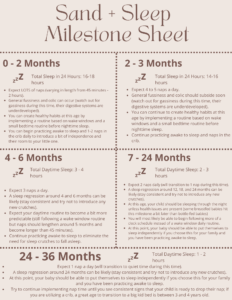How To Handle Your Baby’s Sleep Regression
Ah, The Dreaded Sleep Regression
So you’ve probably stumbled upon this post because first, you’re a parent, and second, you have a child under the age of two that has gone from the best little sleeper in the world to waking up multiple times at night (again?! I thought we were past that) and either taking short naps or refusing them altogether. Now, you’re scratching your head, wondering what the heck happened to your angel baby and why the entire house has not slept in a week.
Well, I have great news for you. Do not worry. Sand + Sleep is here to rescue you from your little one’s new phase that has turned your world upside down. I empathize with you during this time, and remember, sleep regressions are NORMAL!
Continue reading for more information about sleep regressions, what to expect during them, and how to get your baby back on track!
What Is A Sleep Regression?
Let’s jump right into it. Generally, age-specific milestone sleep regressions are caused by a developmental change your baby is going through. You can think of it like your baby’s brain is progressing so fast that it is causing their sleep to regress because they are just so excited about all the mental and physical changes they’re experiencing! So, a milestone regression is not a terrible thing. It actually means your child is growing physically and mentally and advancing normally.
Remember that your child can have regressions apart from the typical ones we hear about. These are caused by specific life events that I will address later. However, listed below are some tell-tale signs of all sleep regressions that you can look out for:
- Re-introducing multiple night wake-ups
- Re-introducing short naps (less than 60 mins)
- Fighting bedtime or nap time
- Skipping naps all together
- General fussiness (more than usual for your child)
When Do Babies and Toddlers Experience Sleep Regressions?
Sleep regressions can occur at multiple different stages of your child’s life. The major one we hear about is the dreaded four-month sleep regression. However, you may experience similar regressions at 6, 8, 12, 18, and 24 months. These can be a bit easier on mom and dad, mainly because you know what to look for and how to best manage them after conquering the 4-month regression. These age-specific regressions generally align with major developmental milestones like crawling or walking.
Other situations can cause a sleep regression, and it is important to keep these in mind so you can recognize and navigate them. Other contributors to sleep regression can be teething, sickness, time change, travel, or lack/change of routine.
Let’s talk about each age-specific sleep regression in a bit more detail.
Four-Month
As I mentioned, the four-month sleep regression is often the most common baby regression we hear about when talking about baby sleep. I am here to tell you, it does not have to be as scary as it sounds! The four-month sleep regression truly is the first developmental event that marks your child’s transition from newbornhood to babyhood.
From zero to 16 weeks, your child is sleeping in 45-60 minute newborn sleep cycles, which means they only have two stages of sleep: light and deep sleep. However, when they hit around four months, their sleep cycles evolve into adult-like 60-120 minute sleep cycles. They now have the REM stage, then two stages of light sleep, and two stages of deep sleep. This new pattern disrupts their prior routine, and it can cause regression.
Six/Eight Month
These two sleep regressions are marked by mental leaps coupled with teething. Your little one is probably starting to learn fun, new skills like sitting up, crawling, and possibly pulling themselves up on furniture (cue the mama panic)! Your baby may also be starting to understand object permanence which means they realize that people and items still exist even when they cannot see them. For example, when you leave their room after putting them to bed, they now know you may just be right outside the door, so they cry out for you and refuse to go to sleep. These new skills, coupled with teething, may start to impact their sleep, but don’t worry; we will discuss some suggestions in a bit!
12-Month
This regression is again marked by growth. Your child is learning many physically challenging activities like walking and verbalizing their feelings through short one to three-word sentences and gestures. In short, they are learning to make their own choices. While it may seem as if they are becoming little human beings during this time, they may revert back to baby-like behavior and show lots of separation anxiety. These progressions together can drastically impact sleep.
18/24 Month
The 18 and 24-month regressions are both caused by marks of independence. Your baby is now a full-on toddler and wants to try/practice lots of new skills (all by themselves, might I add). You may see these needs interfere with sleep because, again, their little brains are kicked into overdrive with all the new and exciting things they are learning. In addition, around two, they may have some significant life changes that they are sensing, whether it be adding a sibling, potty training, or dropping the pacifier. They also are much more aware of the dark, and fear can now play a factor in disrupted nighttime sleep!
How To Handle Your Baby’s Sleep Regression
We’ve identified what a sleep regression is and when it can occur… but the million-dollar question is, what do you do about it? I’ll give you the good news first, a sleep regression and its effects should really only last a few weeks. The bad news…if you as parents allow your little one to run the show, chances are the impacts of the regression (challenging naps & multiple night wakings) will last much longer.
So what can you do?
- Stay consistent with your daytime routine by following an age-appropriate wake window schedule (if you need help figuring out your little one’s wake windows, reach out to me!)
- Try to implement awake-to-sleep for 1-2 daily naps and nighttime sleep (the other naps can be on the go or contact naps, get those snuggles in!)
- Do not introduce ANY new sleep crutches (ex: rocking to sleep if you don’t already do so, feeding to sleep, sleeping in new places)
- Try an earlier bedtime if your little one protests naps during the day. This is my go-to trick to combat overtiredness for all ages but especially during a regression. (ex: if your little one generally goes to bed at 7:30 pm, pull bedtime up to 6:50 pm to allow them to make up the missed sleep from naps overnight)
- Contact your sleep consultant (Sand + Sleep, DUH) if you are not seeing any progress after two to three weeks!❤️
How Working With A Pediatric Sleep Consultant Can Help You Through Your Baby’s Sleep Regression
If you are still struggling with the effects of a sleep regression or want to best prepare for them, schedule an express call with me TODAY! It’s never too late to make changes and never too early to get educated on how to lovingly lead your little one into healthy sleep habits.

Serena is the Founder and CEO of Sand + Sleep. She works with children from birth to three years old and has a passion for helping parents get the most out of every season of life with their little one. You can connect with Serena through Instagram, @sandandsleep or email, serena@SandandSleep.com to schedule a consultation call today!
